It requires guts and skill to translate an idea into a business. These entrepreneurs had enough chutzpah to believe in their products and build successful enterprises.
It Suits Her
As a C-Suite executive with the Dallas Stars Hockey Club, Alana Newhook ’09 Matthews was surrounded by men in custom suits and sport coats. They chose their own fabrics, and the garments they wore were studiously fitted to their frames. The same wasn’t available for Matthews: “I was like, ‘I want that.’”
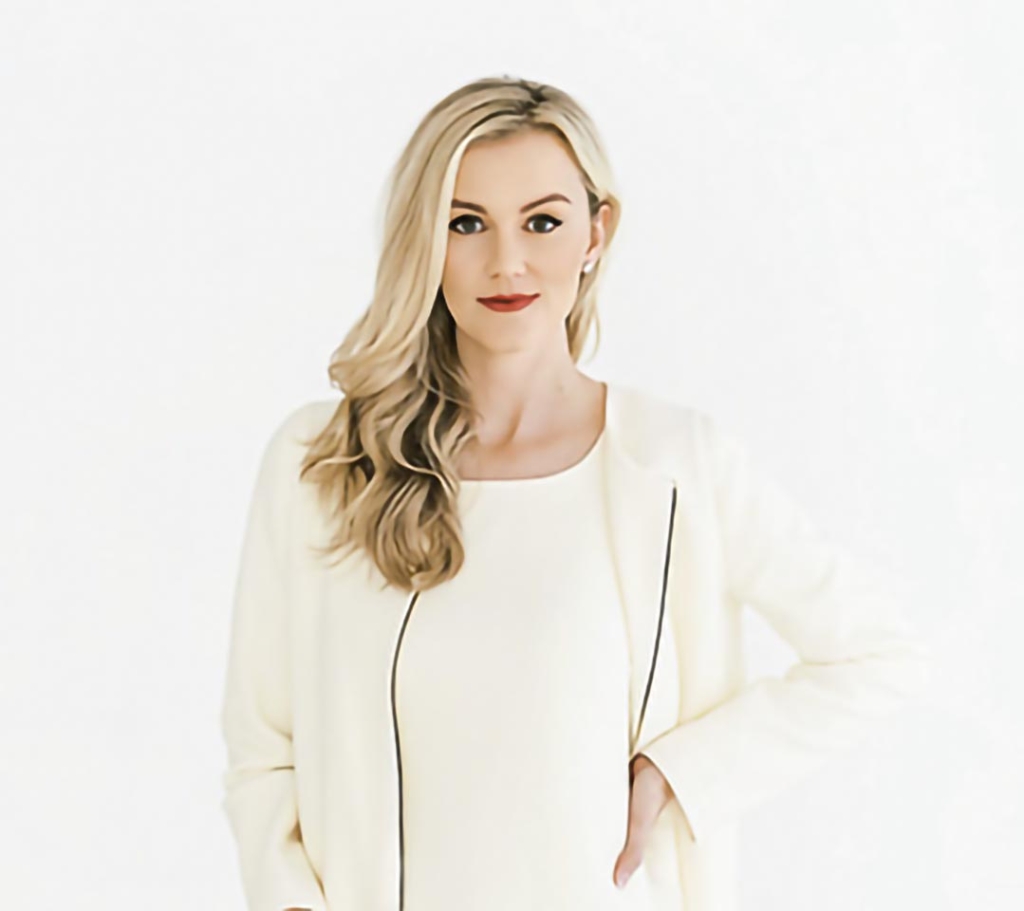
So, in 2018 while pregnant with her first child, Matthews took a leap. She didn’t know what challenges motherhood would bring, so she felt it was the right time to pursue a creative endeavor. “There’s lots of women in executive roles or even building their careers, but the traditional, custom clothing companies tailor for men,” Matthews notes. With Alautus (the name is a portmanteau from the name Alana and the Latin root for elegant, lautus), she seeks to flip the script by providing upscale, versatile workwear for women. Prices range from $449–749.
It’s important to note that Alautus wasn’t an overnight endeavor. Before seriously considering founding the company, Matthews first crowdsourced opinions about whether there was a need to be filled, surveying her wide network of bankers, lawyers, and sports executives. The response was overwhelming — of the custom options women could get, they were either made of cheap fabrics or cost upward of $4,000. The garments were more accessible to Hollywood celebrities than the average executive. And, the pieces were basic, boxy cuts lacking fashionable flair. “I wanted to build something that was an investment piece, but also somewhat attainable,” she says.
“My time in sports really cemented in me a passion for helping women on the way up in their careers.”
Alana Newhook ’09
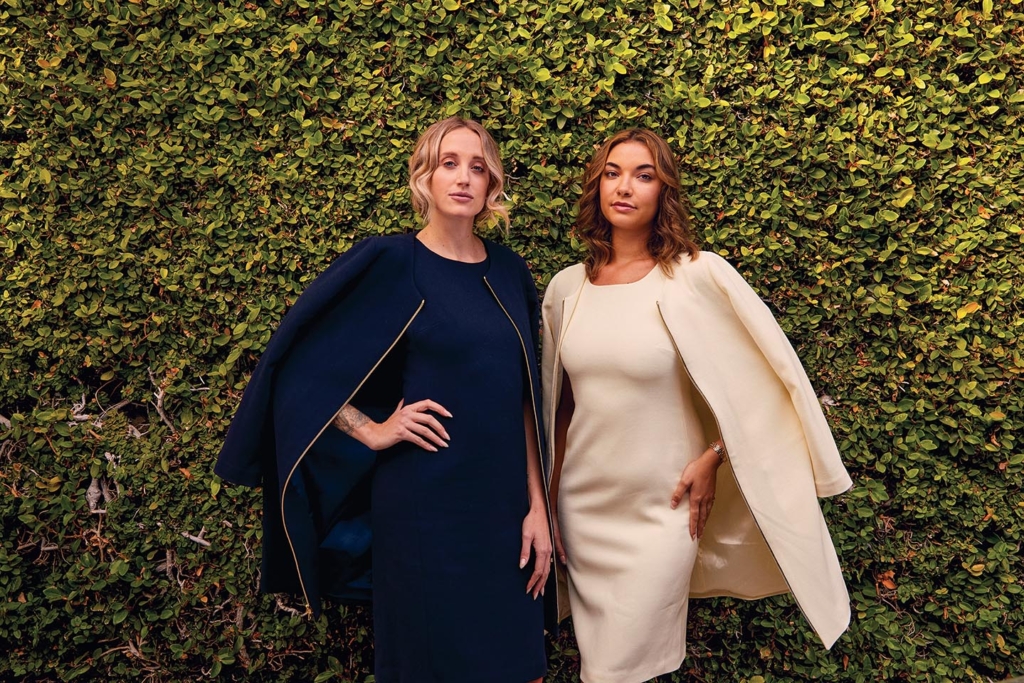
Being the highest-ranking woman at the Dallas Stars didn’t hurt when it came to business experience. In her role as executive vice president of business operations and general counsel, Matthews navigated the general running of the franchise, which appeared at the Stanley Cup Finals in 2020. She says her role helped her round out the skill sets necessary to run her own business. “I could see it as a functioning business, as opposed to just an idea that I was piecemeal putting together.”
Overall though, she sees Alautus as a chance for women to support women: “My time in sports really cemented in me a passion for helping women on the way up in their careers,” she says. “Also, supporting the women who had fought the fight and been successful and risen to the tops of their profession.”
A New Kind of Pocket Protector
In 2018, Hilary Poticha ’95 Kurinsky and her family were having a roundtable chat when the conversation turned to collectible toys. “I wonder why there isn’t a product where an animal’s arms and legs could actually stick out through holes in a pocket?” someone in the group pondered.
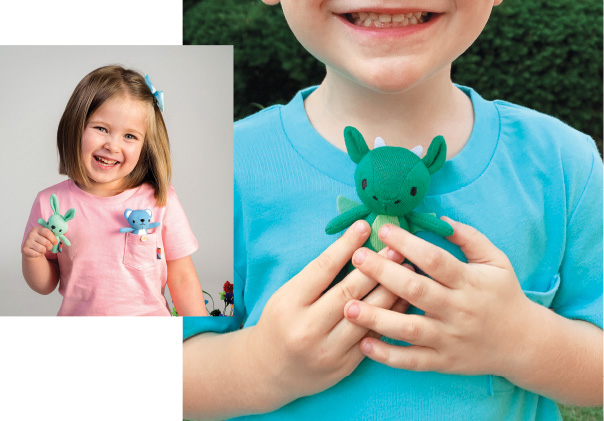
A month later, during the holiday season, Kurinsky noticed an ornament in the shape of an animal with long arms and legs. “I grabbed a T-shirt of mine, and I cut four holes in it,” she remembers. “I took the ornament down and shoved the arms and legs through, and I thought, ‘Huh, that is pretty cute.’”
That’s how Pockimals — palm-sized stuffed animals that button into kids’ pockets — were born. “We say, their belly buttons button in,” Kurinsky notes. In addition to Pockimals, she sells shirts, dresses, and backpacks with button holes that allow the tiny unicorns, foxes, and lions to attach. “Everyone asks, ‘Well, what are you? Are you a clothing company or are you a toy company?’ And I say, ‘I’m all of it.’”
Business Know-How
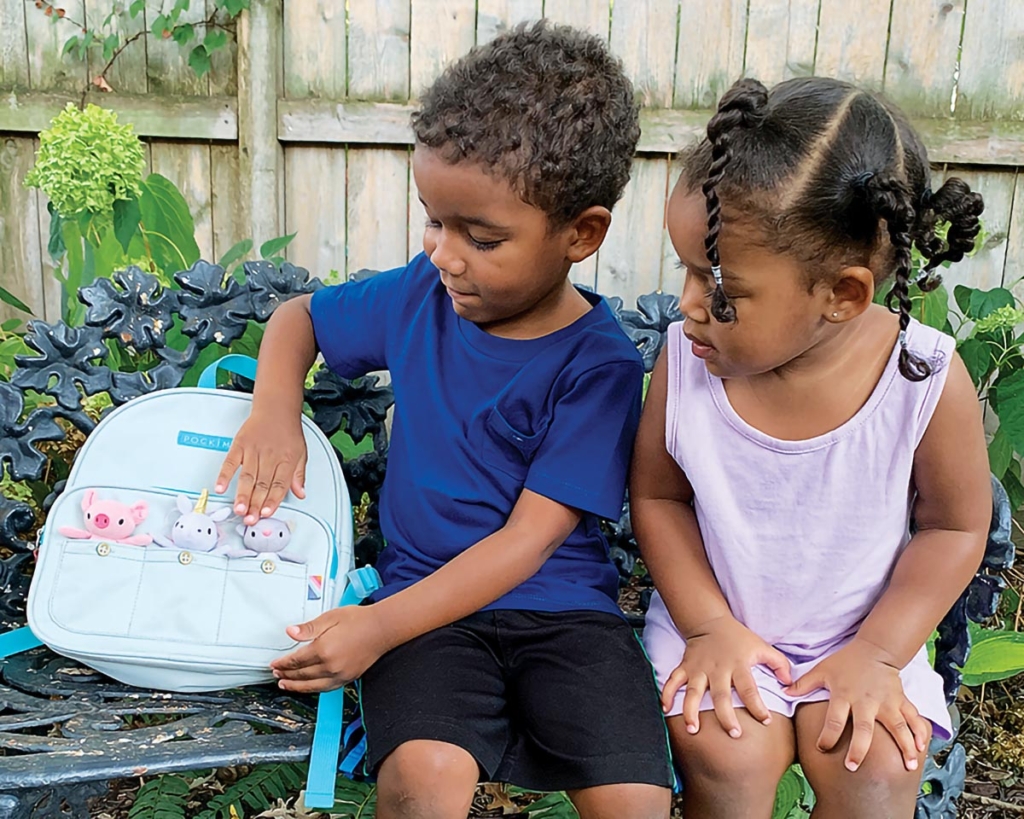
Kurinsky spent 15 years in the banking industry before becoming a stay-at-home mom. She draws from both experiences to successfully run her business.
On Practicality
Attaching the animal to a child’s pocket is cute, but mostly “there’s a place for it to go back for safekeeping with the hope that they don’t lose it,” Kurinsky notes.
Where to Buy
Pockimals are sold on Pockimals.com, Amazon, and Etsy, but recently Kurinsky has also taken the business on the road: The toys are now available in more than 17 stores around the United States, including the Brookfield Zoo in Chicago, an apple orchard in Massachusetts, and festivals in the Midwest.
A Dream Come Tru
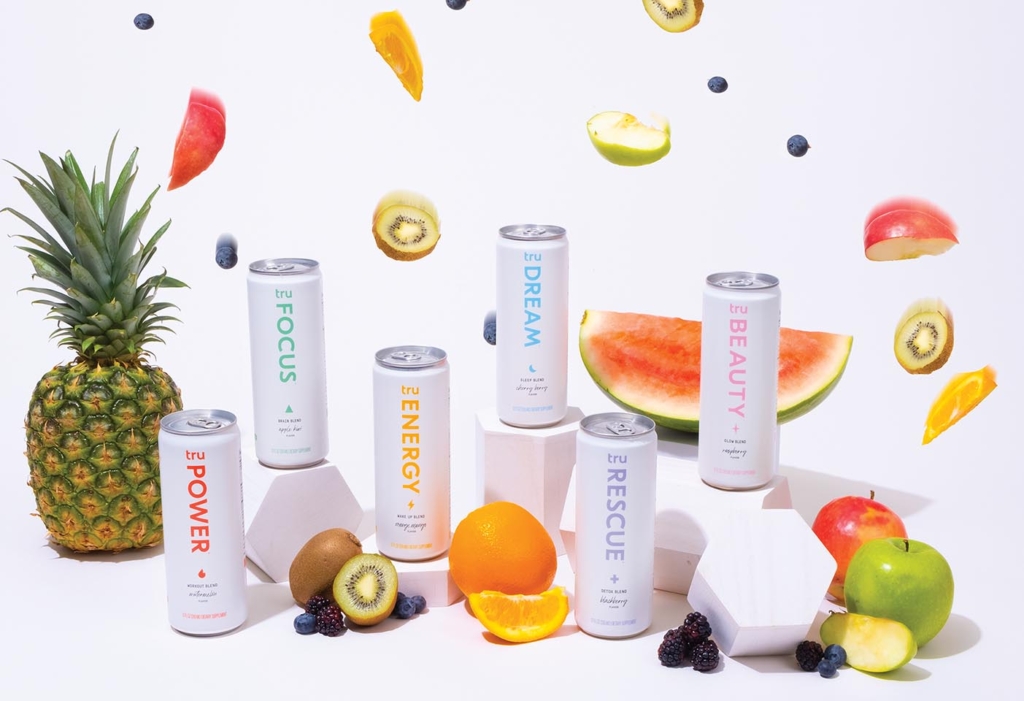
After years scoring goals for Colgate’s men’s ice hockey team, Jack McNamara ’14 wanted to take a shot at a new venture: wellness beverages for athletes like himself. The final product was Tru, a line of health-focused canned drinks formulated to suit a range of needs. For McNamara, the project was research intensive; he was hell-bent on creating something that actually worked. “When I hung up the skates, I reached out to a bunch of different sports dietitians for top teams and basically begged them to talk to me,” McNamara remembers. He ended up sitting down with a former Boston Red Sox dietitian, and they talked ingredients, top-selling brands, and athletes’ common needs.
That conversation led to a seven-year process of making sure each can of Tru tastes great while deliaxavering on its health-focused promises, like better sleep and stronger workouts. “The reason we launched all these products was because these were all problems that I had specifically,” McNamara says. The secret to making Tru work: delegation. With branding by a designer at Blue Bottle and growth led by a salesperson from Red Bull, the team remains lean. “I realized you can’t control every aspect of the business. As a co-founder, it’s difficult to let go,” he says. “But, when you hire the right people and delegate accordingly, things start taking shape in a beautiful way.”
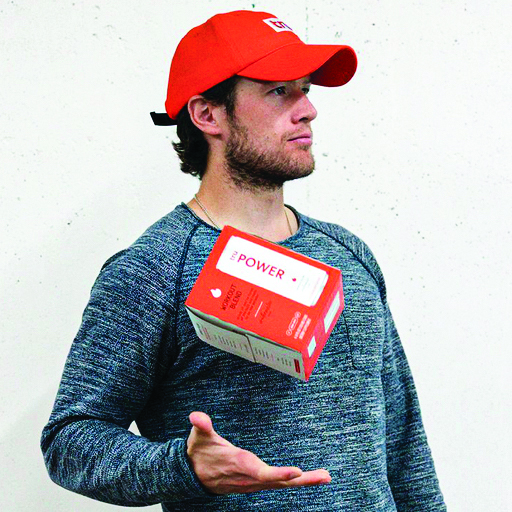
“One of the things we really wanted to stay true to was always using premium natural ingredients in our seltzers.”
Jack McNamara ’14
On Taste
There are seven flavors of Tru: Energy, Focus, Power, Defend, Rescue, Dream, and Beauty. All of the drinks are naturally sweetened, utilizing ingredients like mango juice and green tea. “Our first formulation tasted like tree bark — you have to find a way to balance great ingredients with great-tasting ingredients. It’s been a learning process. Every year, we’ve grown, and we just try not to make the same mistake twice.”
Expanding Horizons
Tru is now found at several retail locations, like Market Basket and Wegmans. “Most recently, we landed a regional launch with Walmart into 430 stores. It’s a big opportunity for us.”
Secret Ingredients
“One of the things we really wanted to stay true to was always using premium natural ingredients in our seltzers. Oftentimes, those are more difficult to work with. Each of our products has a unique blend and a unique juice. Then, we go on from there.”
The Colgate Connection
Phil Corrinet ’70 was one of the first investors in Tru, and McNamara has since served as a mentor for Thought Into Action. Also, McNamara often takes cues from Super Coffee CEO Jimmy DeCicco ’15. “I reach out to him, being like, ‘Hey, yo. I’m having this problem,’ and he always picks up the phone, lends an ear, and helps us out. The entrepreneurial world in food and beverage is really small and extremely supportive.”
Natural-Born Businesswoman
Shirene Brown ’91 is flanked by color.
A rainbow of ribbons, fabrics, and other bits and bobs surround her as she gets to work on the items she sells on her e-commerce website. Among her creations are laser-cut wooden earrings, screen-printed coffee cups, and skincare products made from natural ingredients. Chances are, if you want it, Brown is willing to find a way to make it. “That’s what I do — so many different things,” says the owner of Naturally Made By Shirene. Learn more about what she makes in her studio:
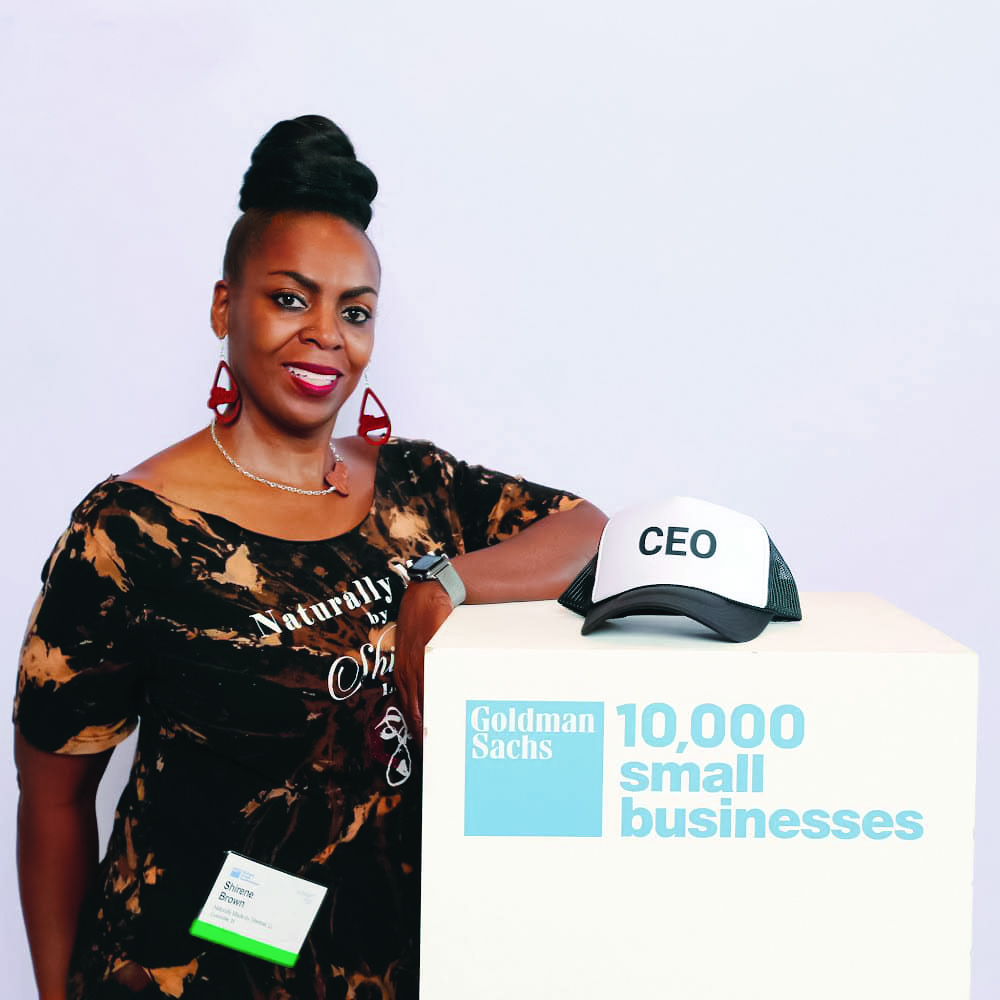
Finding a Solution
One section of her business, the one closest to her heart, is Brown’s skincare line. Throughout her childhood and early adulthood, she struggled with a skin ailment that doctors couldn’t fix with medicine. Trial and error led her to create her Whipped Shea Body Butter, which helped calm the rashes she experienced. She says the process of creating this product helped her gain self-confidence and acknowledge that she was beautiful even with physical imperfections. “Nobody thinks about the mental part of psoriasis, eczema, or skin inflammation,” she notes.
Making Improvements
Brown is actively growing the skincare side of her business, recently enlisting the help of a cosmetic chemist to reformulate some of her bestselling products. In the future, she’s hoping items like her natural deodorant, made with tea tree oil and lavender, will be more shelf-stable. Next on her product agenda: A makeup line made with natural ingredients. “I am, one person at a time, trying to get everybody to become a little more natural and a little more wise about what they put in and on their body.”
Using Her Artistic License
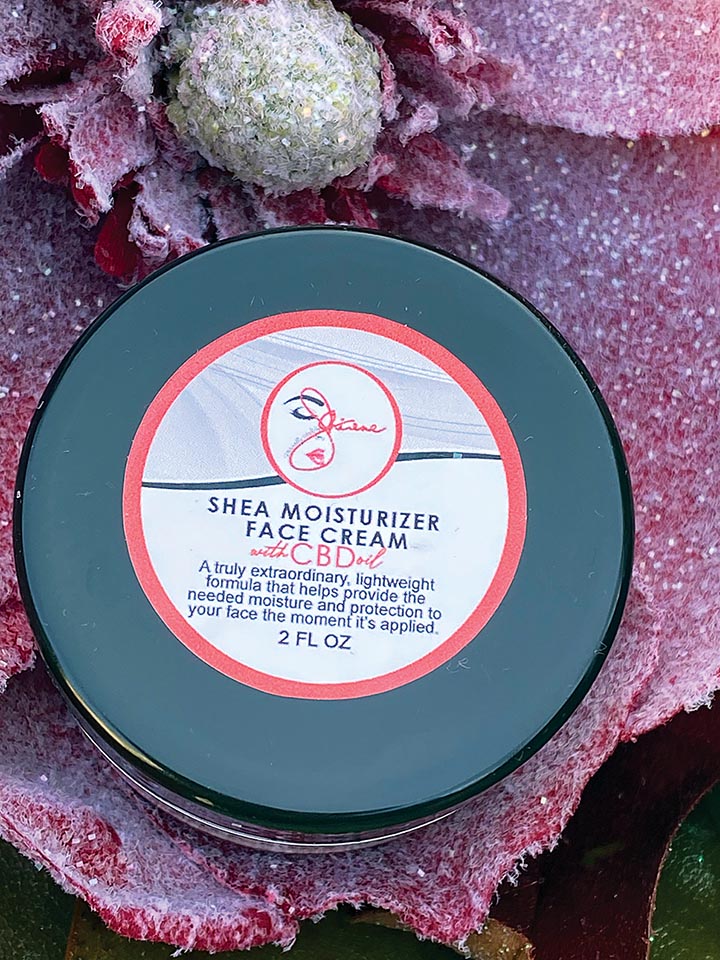
When creativity strikes, Brown runs with it. Recently, she started making hand-painted earrings in the shape of butterflies. “I get to blend paints and come up with different colors. Even today I was thinking of different earrings to design because I’m having fun with it,” she said during her interview with Colgate Magazine. “That’s the creative part of it.”
An Early Business Mindset
Brown first became an entrepreneur at age 8, when she baked and sold bread and pies to members of her community. “I’ve always been a hands-on person,” she says, and that attribute, mixed with innate creativity, led her to pursue several businesses throughout her career.
’Tis the Spirit That Is Colgate
Brown, a Colgate Africana and Latin American studies major, credits the University with helping her learn how to budget for her business. During her senior year, as the vice president of the Black Student Union, she was in charge of the financial aspect of the organization. She’s still connected with Colgate — last year, she designed and engraved the champagne flutes for the 30th anniversary of the Alumni of Color organization.
This Father-Daughter Duo Is Mixing Up the Mezcal Scene
Through a decade of visits to Oaxaca, Mexico, Sydney Block ’18 and her family came to appreciate the ancient, spiritual tradition that is mezcal. So when Block and her father went into business together to launch a mezcal brand, they kept the mezcalero (a person who distills mezcal) at the heart of the company. “We visited upwards of 50, even 100 palenques over the last several years,” Block says, explaining that these small distilleries are often on family farms, and each family makes the alcohol in a slightly different way. “It’s the most amazing experience to see families come together to do this — it’s part of everyday life for many people in Oaxaca.”
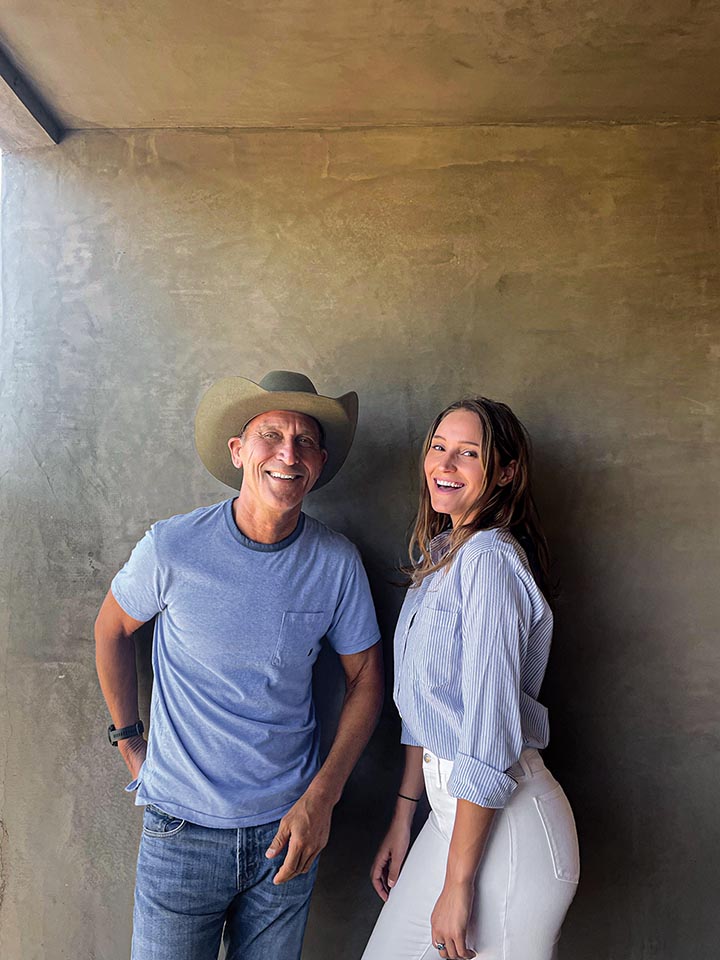
“It’s the most amazing experience to see families come together to do this.”
Sydney Block ’18
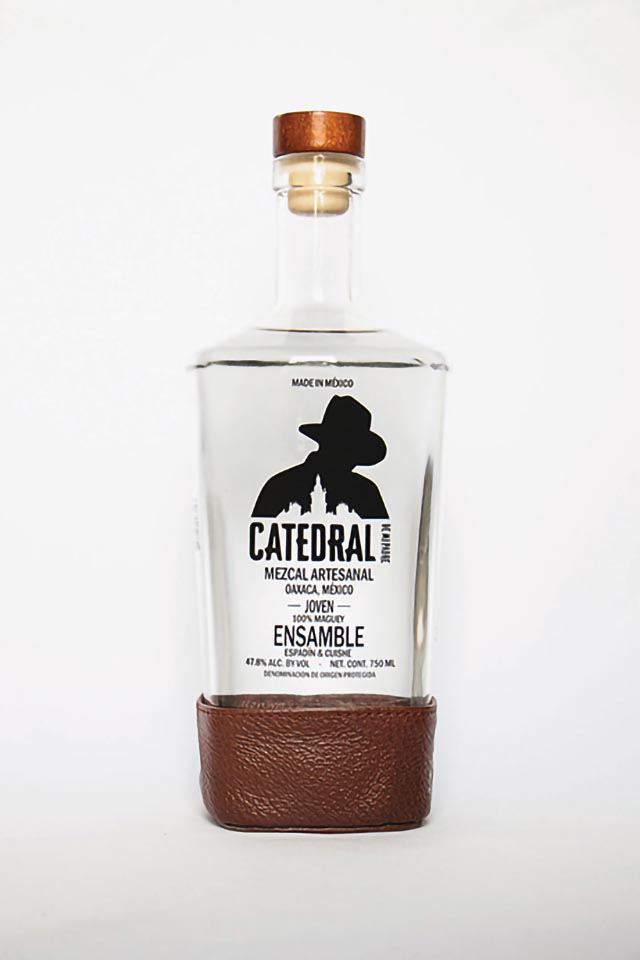
An environmental economics major at Colgate, Block was focused on bringing sustainability into the business from the beginning. Things clicked into place when the father-daughter duo met one mezcalero, Jorge, who is also a botanist working to graft wild agave so the plant can be more sustainably cultivated. Wild agave contains more sugar than cultivated agave, which means better-tasting mezcal, so Jorge is grafting together high-sugar-content wild agave plants and cultivating them on his ancestral land to avoid depleting the region’s wild supply. Each mezcalero the Blocks work with owns equity in the company, and the company plans to use these local partnerships to support more sustainability efforts in the future.
Most of the mezcal market in the U.S. is the espadin varietal, which is made primarily from the blue agave plant, but Block said mezcal is made from more than 40 different types of agave. The brand hopes to introduce mezcal fans to new varietals with six offerings from six different mezcaleros, including an espadin, three wild varietals, and two ensembles. “My personal favorite is the mexicano because it has this beautiful, approachable, citrusy silkiness to it,” Block says. She recommends sipping it neat, at room temperature, with a slice of orange on the side to bring out its bright citrus quality.
From Vintage to Viral
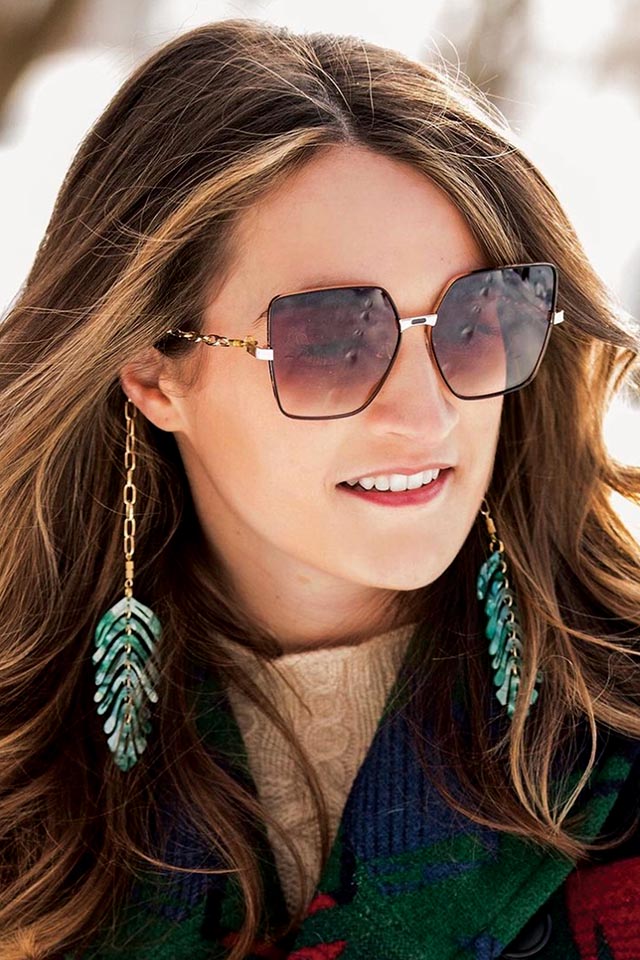
When Madison Bailey ’18 bought a pair of 1960s chain earring sunglasses from a Brooklyn vintage shop, she had no idea that her modern spin on the retro style would become an overnight success. “I had never seen anything like these glasses, and I felt like the coolest person in the world when I wore them, but I also felt like they were lacking in modern colors, styles, and functionality,” Bailey says. In July 2020, she posted a video of herself to TikTok sporting a pair of her homemade chain sunglasses, called SUNLOOPS, and woke up the next morning to 300 preorders.
“One of the first things I did after I fulfilled the 300 preorders was email [Colgate’s Thought Into Action incubator] because I recognized that I needed help,” she says. By the end of 2020, she had left her job at the United Nations to run SUNLOOPS full-time, relying on the daily and weekly check-ins with her Thought Into Action mentors Kate Foster ’99 Lengyel and Julie DeLoca ’91 to help her navigate being a first-time CEO.
The company has been featured on the Today Show as well as in People Magazine and Marie Claire, among other media outlets.
“To put the power of social media into perspective,” Bailey says, “in April 2021, I had five videos go viral on TikTok and Instagram Reels in the span of one week, and those videos directly led to $20,000 in organic sales, without me having to spend a cent on marketing.”
On a Roll
Parents want the best for their kids — especially with the first child, decisions can be most precious. Barry Donaldson ’03 and his partner, Danielle, are no exception. When the couple had baby Nola, they wanted to buy her a ball pit for playtime. The parents ordered two types, but they weren’t up to snuff. “Their foam was sourced overseas, so it wasn’t good quality,” Donaldson explains. Based in Canada, the pair found a company that provides soy-based organic materials and “we just went with it from there,” he says. “We started building everything ourselves, ball pits and play mats.” Balu Organics was born in 2020.

Stars, they’re just like us: Justin and Hailey Bieber bought one for their nephew; Ashley Tisdale, Dakota Fanning, and several basketball players have also purchased the ball pits.
Snowball effect: When the couple started the business, they were running it out of their home. Soon, they moved into a storage facility and have since moved twice into new warehouses as the operation has expanded. “We’ve always taken the money we’ve made and rolled it back into the company. It’s like a snowball that we’re rolling downhill to make it bigger and bigger.”
“We started building everything ourselves, ball pits and play mats.”
Barry Donaldson ’03
Adults can have fun too: When some customers half-joked that the company should make a ball pit for adults as well, “we did and it’s gone really well.” They’re also looking into making slides for the ball pits and kid-sized couches.
By day: Donaldson, who majored in computer science at Colgate, has been a project manager for the City of Toronto for the past 17 years. He earned his MBA at Ryerson University in 2010 with the plan of starting a business.
The latest addition: The couple had a second child, Myles, in November 2021. We wonder: What will he inspire his parents to do?
A Little Flourish
The last two times the Boston Red Sox won the World Series, Michael Kanners ’90 got a call. One of his clients, who works in the team’s front office, wanted custom-made cuff links to commemorate each event. In 2013, Kanners crafted a pair in the shape of a baseball; the 2018 commission was more ambitious — in the form of the World Series trophy. “It was rather challenging to try and create something that’s about 2 feet tall into a cuff link,” Kanners says, “but we got all the details down.”
A third-generation jeweler, he has tapped into a niche market for bespoke cuff links. Kanners joined the family business after earning his bachelor’s at Colgate and a gemology degree from The Gemological Institute of America. A segment of the clientele were collectors who were in search of vintage cuff links. “The clients started asking me to make them new designs since there just wasn’t enough of what I was trying to hunt down for them.”
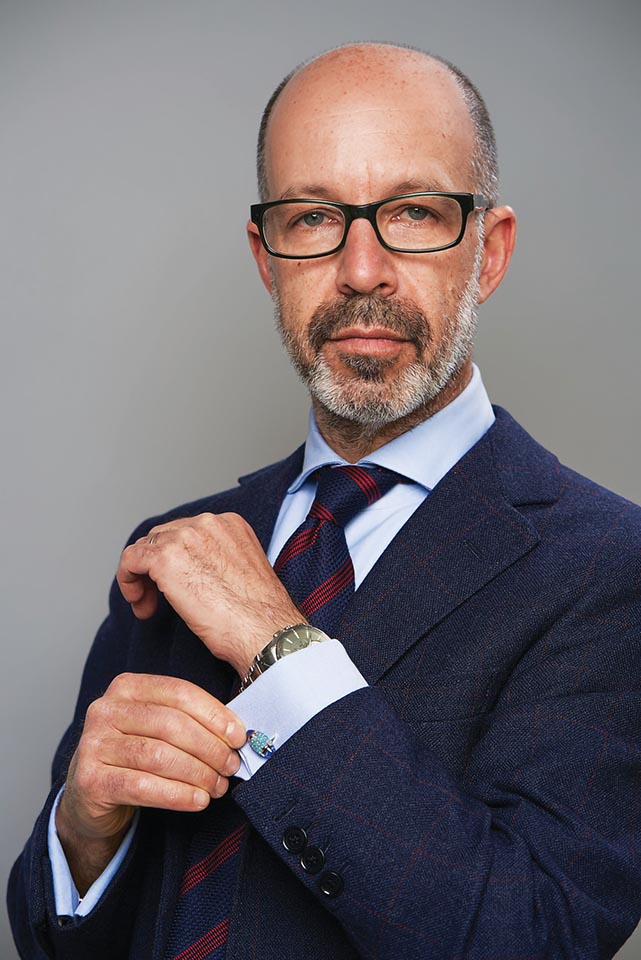
Most of Kanners’ cuff links range from $5,000–9,000. He acknowledges that it’s an expensive price point but explains that they’re costly because of the work involved. The process begins with Kanners sketching out the design and then collaborating with workshops in Italy, Germany, and New York City. “These are the most highly sought-after stone carvers in the world,” he says, adding that the labor is the largest portion of the cost. His customers, therefore, are people “who appreciate finely made things.”
The process begins with Kanners sketching out the design and then collaborating with workshops in Italy, Germany, and New York City.
Michael Kanners ’90
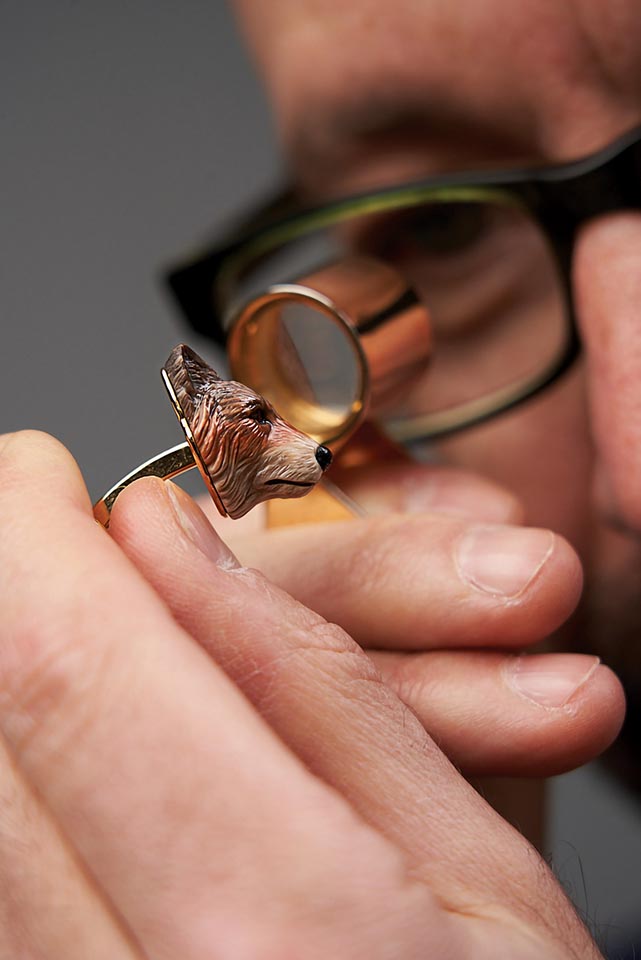
His Colgate philosophy degree guides his work: “I try to figure out how the stones look best, what it means to be mounting each particular stone, and what the point of it is. There’s more thought behind it rather than just aesthetic design.”
Most challenging commission: A Wake Forest University alumnus requested four sets of cuff links representing the school’s mascot, the Demon Deacon, with “WF” on the back. The client requested various hard stones — e.g., onyx for the hat; white agate for the hair, eyes, and teeth; and light brown jasper for the face.
What he’s working on now: “I’m more gemstone oriented … traditional stones like aquamarine, amethyst, or tourmaline, but still using modern techniques.” He’s also testing out different metals, like titanium: “You can anodize it into different spectral colors and then you can create very modern- looking designs. I’m doing more custom women’s jewelry now as a result of the cuff links. People are seeing that I have the ability to create things that are completely different.”
On his sleeve: Kanners says his personal collection of cuff links is rather small. He has a few pairs that his father and grandfather handed down, and he kept a couple of the first sets he made for the company. “My own dress is generally conservative,” he told Sarto magazine, “but I always like a subtle highlight. I think that one little flourish, which is under your sleeve most of the time anyway, when it’s revealed, it’s a nice touch.”
A Life Changer for One, and a Game Changer for Others
The Holy Grail of energy. That’s what David Feldman ’89 had stumbled upon, a kinesiologist told him.
Feldman was testing out the origins of UCAN, which is now a variety of products that athletes use to fuel their bodies. At the time, though, he was looking for a solution to a much more personal concern.
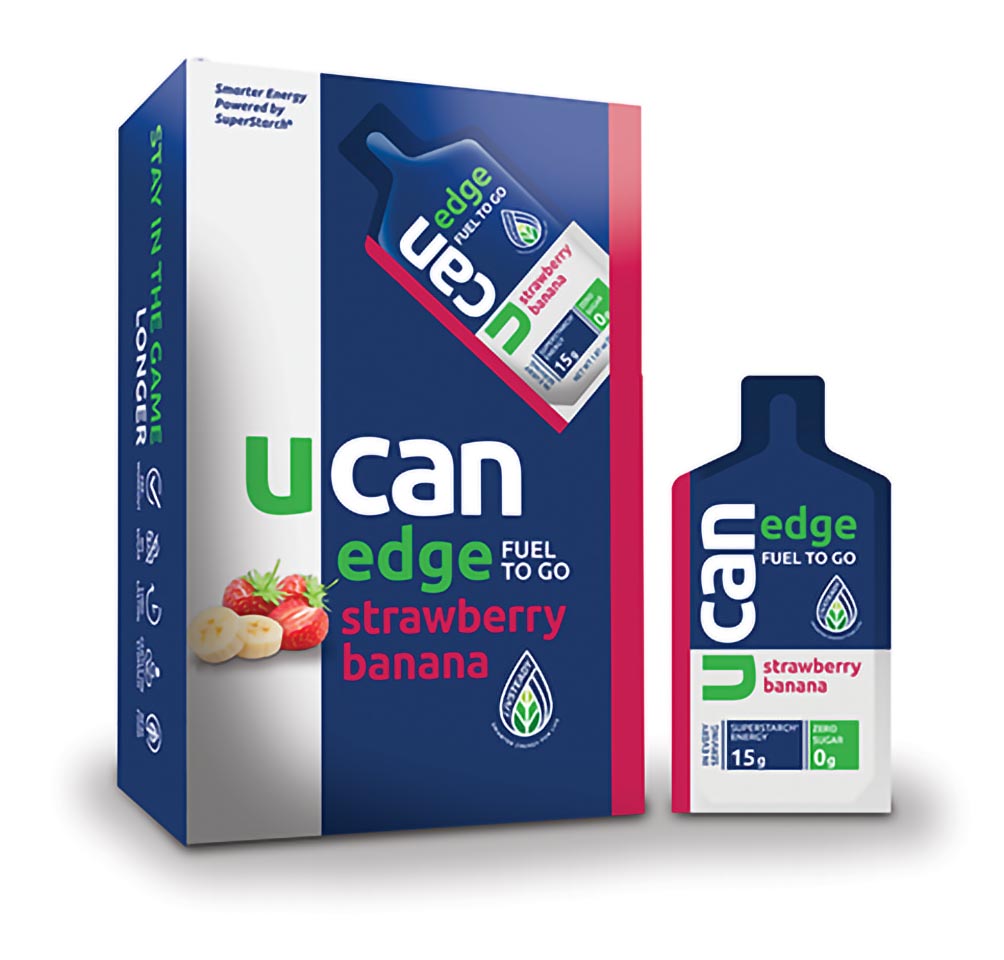
His infant son, Jonah, was born with a rare metabolic disorder called glycogen storage disease (GSD) type 1a, which prevents the liver from metabolizing glycogen into glucose. The body’s natural source of energy, glucose affects brain function, the respiratory system, and phosphate balance. Feldman and his wife had to feed Jonah every three hours. At night, they’d set double alarms to ensure that they wouldn’t oversleep and miss a feeding, which could have dire consequences. “We were looking for something — is there anything out there to improve life for the patient, for the caregivers, something to be made easier?” remembers Feldman, who is an orthodontist.
Through research, they found the inventor of SuperStarch, a slow–energy release starch that could lengthen the time between Jonah’s feedings. The inventor had sold the license for the starch’s use in GSD, but he licensed its use for consumer nutrition to the Feldmans. In addition to glucose management, “We realized what we had was good for a variety of things: athletics, metabolic control, healthy living,” Feldman says. In 2009, he co-founded The UCAN Company as a sports nutrition business. The products — gels, powders, bars — are purchased by more than 40 pro teams (including the Patriots), 300 college teams, and elite athletes. The company has rebranded the starch to LIVSTEADY, with the message that it’s a product that provides steady energy for active lifestyles and everyday health. Feldman also seeks to further the applications of LIVSTEADY to provide life-altering solutions of energy management for type 1 and type 2 diabetic individuals.
As for Jonah? The starch has been a “life changer,” Feldman says. Jonah’s even able to be a typical college kid — at Colgate, in fact, as a member of the Class of ’24.
